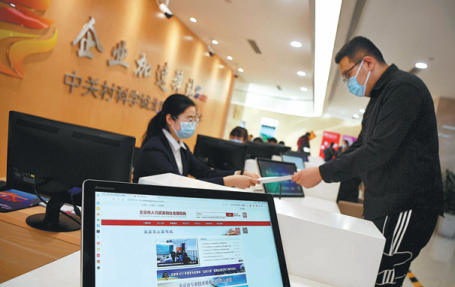Five campaigns to drive high-quality development
Beijing is exploring a coordinated growth path that stimulates market vitality, creates a top-notch international business environment and realizes high-quality development, local officials said.
There are five major development drives that Beijing is focused on. They include building itself into an international scientific and technological innovation center; developing the China (Beijing) Pilot Free Trade Zone and the Integrated National Demonstration Zone for Opening Up the Service Sector; and creating a global digital economy benchmark city.
The other two are to advance supply-side structural reform to create new market demand and relocate the industries that are out of tune with the capital's development blueprint to neighboring areas in a bid to promote the Beijing-Tianjin-Hebei region's coordinated growth.
The five drives can be combined into a force that promotes the city's high-quality development, officials said.
One of the efforts to advance the coordinated development is the construction of an industrial measurement technology innovation center, which was inaugurated at the Beijing Economic-Technological Development Area in 2021.
The facility is aimed at promoting innovation cooperation among diverse parties, ranging from industry, academia, researchers and inspectors to users and investors.
It provides a public service platform for showcasing new technologies and products; research into industrial standards; measuring and testing; inspection and detection; certification; commercialization of technological achievements; and intellectual property operation, offering systematic integral solutions.
Creating a better legal environment is another part of the city's push to spur healthy growth in the local economy.
For instance, the city issued regulations on prepaid cards for a single purpose in June 2022, which came together with eight recommended standard forms of contracts.
After the regulations came into force, they were conducive to the resumption of production and business, said an executive surnamed Zheng at Mubei, a consultancy and training company in Beijing.
"It is convenient to have such standard contracts available, which helps to enhance consumer faith in us," she said.
The regulations have created a full-process management system governing the use of prepaid cards.
According to the regulations, business operators are banned from issuing prepaid cards or renewing such cards, if they are found to have acted in bad faith.
For prepaid cards issuers, local financial regulators have set up an information platform for capital deposit and management, via which the authorities can give forewarning to help mitigate industrial risks.
By the end of August, the platform had incorporated 23 banks that deal with prepaid card capital accounts, which were opened by more than 1,100 businesses. The combined amount of prepaid card deposits on the platform reached more than 7 billion yuan ($1 billion) at peak times, local media reported.
The Beijing-Tianjin-Hebei coordinated regional development is also a highlight of the combined growth strategy.
Beijing, Tianjin and Hebei province signed a framework agreement for an integrated business environment in September 2022.
To aid progress in the business environment integration, central and local governments have worked together. The three regions collaborated to advance the standardization work among them.
Such practice has been included among the best cases of the Integrated National Demonstration Zone for Opening Up the Service Sector. Seventy-five united standards were released in the three regions in 2022.
The three regions have also enhanced cooperation in enforcement. During the Beijing Winter Olympic and Paralympic Games in early 2022, the Beijing administration for market regulation reported infringements on the unauthorized use of the Olympic logo to its peers in Hebei, and reported one related infringement to those in Tianjin.
The Beijing administrators cooperated with the Beijing Organizing Committee for the Olympic and Paralympic Winter Games in dealing with more than 200 disputes involving Olympic intellectual property.

A client is served at a human resources service center, which is dedicated to the China (Beijing) Pilot Free Trade Zone at Zhongguancun Science Park. YUAN YI/FOR CHINA DAILY
